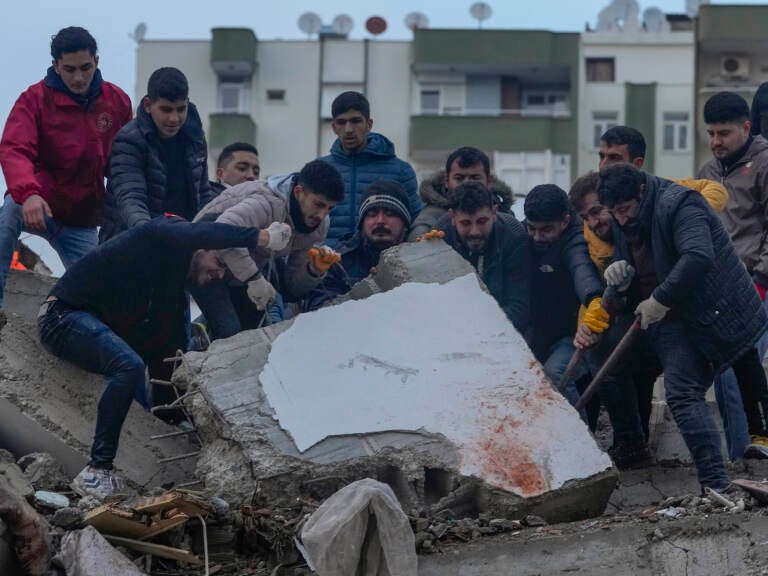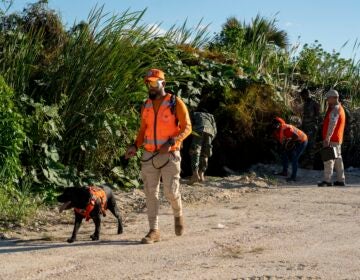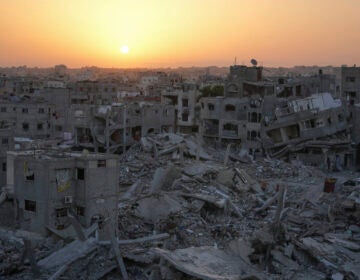Rescuers work for second day to find quake survivors as death toll surpasses 5,000

Men search for people among the debris in a destroyed building in Adana, Turkey, Monday. (Khalil Hamra/AP)
Rescue workers fanned across Turkey and Syria Tuesday, in a second day of racing to find survivors from the massive earthquake and multiple aftershocks that leveled thousands of buildings across the region, and sent the confirmed death toll soaring past 5,000 people.
Freezing winter temperatures and dozens of aftershocks from Monday morning’s magnitude 7.8 earthquake hampered the work to sift through the rubble of buildings and find survivors who are at risk of suffering from hypothermia as temperatures dip below 27 degrees Fahrenheit.
In the southern Turkish city of Adana, worried residents outside a collapsed building watched rescue workers search for people under the rubble. The 15-story residential high-rise was just one of 11 buildings that fell in the city.
Two elderly women and a man were embracing each other and crying after one of their daughters had died. “She was happy,” one of them said. “We couldn’t imagine it would end like this.”
By midday Tuesday, the death toll in Turkey and Syria had surpassed 5,100, including 3,419 in Turkey, with 20,534 people injured in the country, The Associated Press reported. Another 1,602 people have been confirmed dead on the Syrian side of the border. Officials warn the toll will continue to rise; the World Health Organization said the death toll in the two countries could eventually rise above 20,000.
The quake hit at 4:17 a.m. local time in Turkey’s Gaziantep province, the U.S. Geological Survey said. It took place on the East Anatolian fault, the boundary between the Anatolian plate, the African plate and the Arabian plate of the Earth’s crust. The largest aftershock, measuring 7.5, struck about 60 miles to the north of the epicenter of the initial one on a different fault line.
About 13.5 million people were affected over 10 provinces in Turkey, according to the government. More than 7,800 people in Turkey have been rescued. The government also said more than 11,000 buildings have been damaged.
Dozens of countries around the world, including the United States, dispatched teams to assist in the rescue efforts, and Turkey’s government said more than 13,000 rescue workers had left Istanbul to help those affected in the region by late Tuesday morning.
A Syrian baby born in the rubble
Reports of a heart-wrenching moment are emerging from northern Syria, from a town in the Aleppo region, where relatives pulled a newborn baby alive from a toppled home, according to the Agence France-Presse and Syrian media. AFP reported that a relative said that the baby had been found still connected by her umbilical cord to her mother, who had died along with the rest of her immediate family when the house collapsed in Monday’s earthquake.
The toll from the quake and aftershocks devastated a region already suffering from more than a decade of civil war in Syria, a conflict that has spurred more than 3.5 million Syrian refugees into Turkey. An estimated 4.1 million people in the affected region were already receiving United Nations humanitarian assistance.
On Tuesday, NPR reached Antakya, Turkey, and found a city built over many years to be devastated by about 80 seconds of earthquake.
One local hospital had collapsed at an angle.
Outside a half-toppled building, a woman told NPR her 42-year-old son was alive but trapped in the rubble and she was trying to get rescue workers to pull him out.
Scenes like this are unfolding in both countries in a desperate search for survivors, with time passing quickly and obstacles in the way.
Humanitarian groups in the region said the only crossing between Turkey and Syria approved by the U.N. for transporting international aid has been unusable since the earthquake struck, further hampering efforts.
Sherlock reported from Adana and Antakya; Schmitz from Istanbul.
9(MDAzMzI1ODY3MDEyMzkzOTE3NjIxNDg3MQ001))




